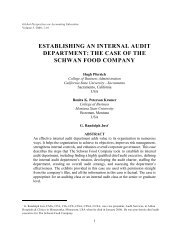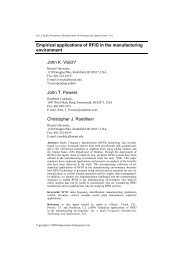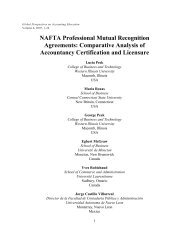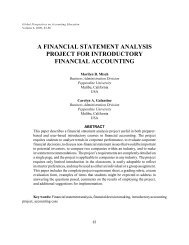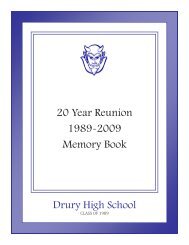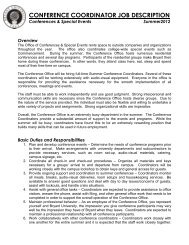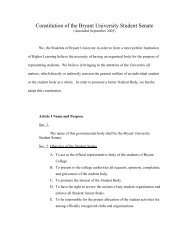Why use multiple-choice questions on accounting - Bryant
Why use multiple-choice questions on accounting - Bryant
Why use multiple-choice questions on accounting - Bryant
Create successful ePaper yourself
Turn your PDF publications into a flip-book with our unique Google optimized e-Paper software.
32 Simkin, Keuchler, Savage, and StiverA number of recent studies dispute these findings. For example, using a two-stage leastsquares estimati<strong>on</strong> procedure, Becker and Johnst<strong>on</strong> (1999) found no relati<strong>on</strong>ship between studentperformance <strong>on</strong> MC and essay <str<strong>on</strong>g>questi<strong>on</strong>s</str<strong>on</strong>g> <strong>on</strong> ec<strong>on</strong>omics examinati<strong>on</strong>s, and therefore c<strong>on</strong>cluded that“these testing forms measure different dimensi<strong>on</strong>s of knowledge” (p. 348). A similar study inphysics instructi<strong>on</strong> by Dufresne et al. (2002. p. 175) led the authors to c<strong>on</strong>clude that student answers<strong>on</strong> MC <str<strong>on</strong>g>questi<strong>on</strong>s</str<strong>on</strong>g> “…more often than not [give] a false indicator of deep c<strong>on</strong>ceptual understanding.”Finally, in the areas of <strong>accounting</strong> and informati<strong>on</strong> systems, works by Kuechler and Simkin (2003)and Bible et al. (2008) found <strong>on</strong>ly moderate relati<strong>on</strong>ships between the MC and CR porti<strong>on</strong>s of thestudy examinati<strong>on</strong>s.A potential explanati<strong>on</strong> for why earlier empirical work has not yielded more c<strong>on</strong>sistentfindings is that the type of CR <str<strong>on</strong>g>questi<strong>on</strong>s</str<strong>on</strong>g> <str<strong>on</strong>g>use</str<strong>on</strong>g>d in the analysis may vary by domain. For example, ifthe CR porti<strong>on</strong>s of most English literature examinati<strong>on</strong>s involve essay <str<strong>on</strong>g>questi<strong>on</strong>s</str<strong>on</strong>g>, the higher-levelorganizati<strong>on</strong>al and expository skills required to answer them are less likely to correlate with studentperformance <strong>on</strong> MC <str<strong>on</strong>g>questi<strong>on</strong>s</str<strong>on</strong>g>, ostensibly over the same material. But this may not be a problem inthe <strong>accounting</strong> or engineering areas, where CR <str<strong>on</strong>g>questi<strong>on</strong>s</str<strong>on</strong>g> are often computati<strong>on</strong>al, usually requirestudents to adhere to more rigid standards of logic, and correct answers have less room for variance.As a result, it may be reas<strong>on</strong>able to expect a closer relati<strong>on</strong>ship between student performance <strong>on</strong> theMC and CR porti<strong>on</strong>s of student examinati<strong>on</strong>s in these areas. Again, a closer relati<strong>on</strong>ship bodes wellfor professi<strong>on</strong>al certificati<strong>on</strong> examinati<strong>on</strong>s that rely solely <strong>on</strong> MC <str<strong>on</strong>g>questi<strong>on</strong>s</str<strong>on</strong>g>.As noted earlier, there is also the issue of gender bias. Here, too, the empirical evidence isinc<strong>on</strong>sistent. Some studies have shown a possible advantage of males relative to females <strong>on</strong> MCtests (Lumsden et al., 1987; Bolger and Kellaghan, 1990; Lumsden and Scott, 1995). Bridgeman andLewis (1994) estimated this advantage to be about <strong>on</strong>e-third of <strong>on</strong>e standard deviati<strong>on</strong>. However,other studies have shown no significant difference between males and females when both areevaluated using a MC test rather than a CR test (Chan and Kennedy, 2002; Greene, 1997; Walstadand Becker, 1994).It is possible that “gender bias” may depend up<strong>on</strong> a variety of factors, including theparticular sample <str<strong>on</strong>g>use</str<strong>on</strong>g>d to address this questi<strong>on</strong> as well as the discipline from which the sample istaken (Hamilt<strong>on</strong>, 1999; Gallagher and De Lisi, 1994). The relevant questi<strong>on</strong> here is whether MC<str<strong>on</strong>g>questi<strong>on</strong>s</str<strong>on</strong>g> are gender-neutral <strong>on</strong> <strong>accounting</strong> certificati<strong>on</strong> examinati<strong>on</strong>s. To date, several studies haveexplored the relati<strong>on</strong>ship between “test format” and “gender bias” in the <strong>accounting</strong> area. One studyby Lumsden and Scott (1995) found that males scored higher than females <strong>on</strong> MC <str<strong>on</strong>g>questi<strong>on</strong>s</str<strong>on</strong>g> whentaking the ec<strong>on</strong>omics secti<strong>on</strong> of the Chartered Associati<strong>on</strong> of Certified Accountants examinati<strong>on</strong>,while another study by Gul et al. (1992) found no gender differences in students taking MCexaminati<strong>on</strong>s in an auditing class. Tsui et al. (1995) replicated the Gul et al. (1992) study, but didnot report gender differences.Finally, Bible et al. (2008) identified “gender” as a small, but statistically significantdeterminant of student performance <strong>on</strong> MC <str<strong>on</strong>g>questi<strong>on</strong>s</str<strong>on</strong>g> <strong>on</strong> intermediate <strong>accounting</strong> tests. However,these researchers also found that the statistical significance varied by class secti<strong>on</strong>, leading them toc<strong>on</strong>clude that gender differentials were at best “small.” They also noted that the language-processingskills often required <strong>on</strong> the essay porti<strong>on</strong>s of tests in other disciplines were not at play in the tests<str<strong>on</strong>g>use</str<strong>on</strong>g>d in their study.


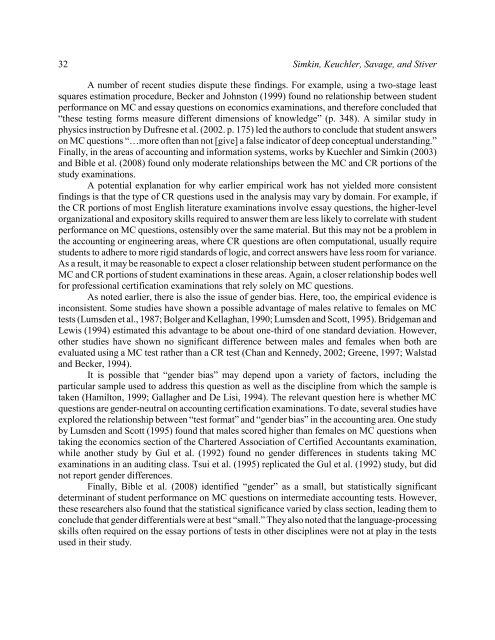
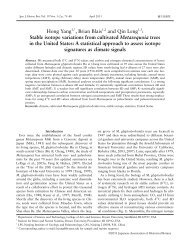
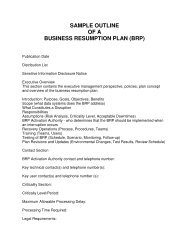
![[1] The Legal Environment of Business (LGLS211) Andrea Boggio ...](https://img.yumpu.com/45269009/1/190x245/1-the-legal-environment-of-business-lgls211-andrea-boggio-.jpg?quality=85)
